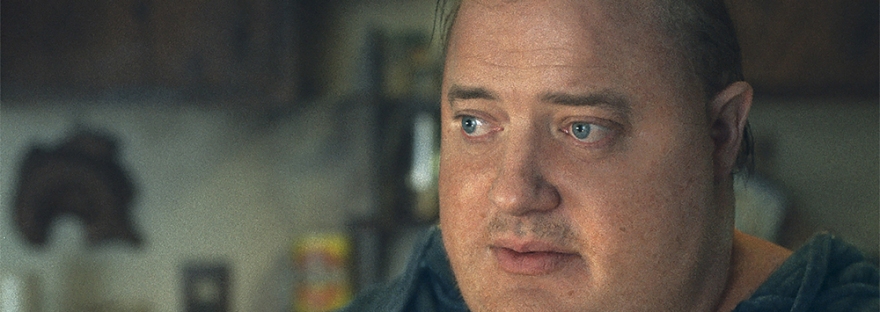
However pleasing it is to be living through the ‘Brenaissance’ – a term coined to mark the return of Brendan Fraser in his first major role in more than a decade – not even his excellent turn in director Darren Aronofsky’s latest film can save it from falling into the trappings of emotionally manipulative melodrama.
As Charlie, a morbidly obese online English teacher trying to reconnect with his estranged teenage daughter after the death of Alan, the partner he left his family for, Fraser brings to The Whale some much-needed humanity: his gentle demeanour and endearing puppy-dog optimism shining through the layers of showy prosthetics he disappears under. It’s such a shame then that Aronofsky’s largely vapid film, with an oftentimes clunky script from Samuel D Hunter, can’t match the compelling performance at its centre.

Based on Hunter’s own 2012 stage play, The Whale is a deluge of contrivances and coercion. At least initially though, its theatrical origins shrewdly serve the emotional state of its central character. Charlie’s relationship with food, an addiction that sees him eat until he vomits, is a form of self-punishment, rooted in the guilt and grief he feels about abandoning his family and losing Alan, whose sister Liz (a terrific Hong Chau) regularly stops by to check on him. Unfolding almost entirely inside Charlie’s dimly lit Idaho apartment over the course of a week, the single location, coupled with the film’s claustrophobic 1.33 aspect ratio, neatly mirror his intense feelings of isolation and entrapment.
But an eating disorder is a complex, nuanced issue, and the increasingly stagey set up quickly undermines any meaningful examination of the subject matter. The supporting characters, including Charlie’s self-destructive daughter Ellie (Sadie Sink) and Ty Simpkins’ meek Christian evangelist, conveniently show up during the film’s key, if overly familiar narrative beats, while the harsh, dramatic strings of Rob Simonsen’s score seem to double down on the film’s manipulative approach.
And as Charlie grapples his existential dilemma, grand ideas around religion and philosophy are hastily weaved into the tale – The Bible and Herman Melville’s Moby Dick are repeatedly referenced throughout. At best, however, such themes lack focus; at worst, they feel like clumsily shoehorned meditations designed to give the story a sense of thematic gravitas.
In the end, it is the character drama at the heart of The Whale that is always its most intriguing element. The relationships between Ellie and Charlie, between Charlie and Liz, and indeed between Charlie and himself: it’s these moments that keep The Whale afloat, even as everything else quickly begins to sink.
George Nash is a freelance film journalist. Follow him on Twitter via @_GeorgeNash for more movie musings

